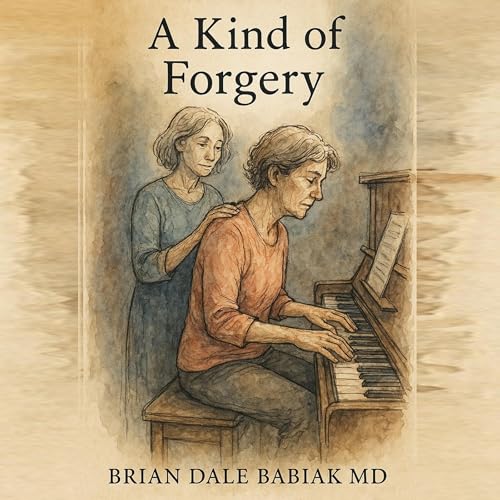
A Kind of Forgery
Neuroscience and Psychiatry in Fiction - The Henry James 2.0 Project, Book 2
Falha ao colocar no Carrinho.
Falha ao adicionar à Lista de Desejos.
Falha ao remover da Lista de Desejos
Falha ao adicionar à Biblioteca
Falha ao seguir podcast
Falha ao parar de seguir podcast
Assine e ganhe 30% de desconto neste título
Compre agora por R$ 51,99
-
Narrado por:
-
Maria McCann
Sobre este título
For Robert Aldridge, once a gifted jazz pianist, memory has become a broken instrument. For his daughter Margaret, it’s a part she must learn—whether or not it belongs to her.
Each Sunday, Margaret Hollis visits her father at Willowbrook Memory Care, bracing herself for the steady erosion of his mind. But one afternoon, his face lights with a rare affection and he calls her “ma chérie.” Only he isn’t seeing Margaret—he’s mistaking her for Naomi, the estranged half-sister Margaret has resented all her life. Instead of correcting him, Margaret makes a radical choice: she becomes Naomi.
What begins as a single merciful deception spirals into a full-scale performance. Margaret studies Naomi’s biography, takes jazz piano lessons, even rehearses the phrases of a life not her own. For the first time, she feels the warmth of a father’s love—borrowed, but intoxicating. Yet when the real Naomi, a renowned music therapist, returns, Margaret’s fragile construct begins to fracture. Sister against sister, truth against comfort, they must decide: can counterfeit love, offered with genuine intent, become its own kind of truth?
With prose that captures the cold antiseptic corridors of the care facility and the tremor of a remembered chord under fading fingers, A Kind of Forgery is a piercing exploration of memory, performance, and the ethics of care. It asks a question that will linger long after the final tick: what matters more—the facts of our identity, or the love we are able to give?
For listeners of Kazuo Ishiguro’s The Remains of the Day, Lisa Genova’s Still Alice, and Elizabeth Strout’s Olive Kitteridge, this is a novel for anyone who has wondered whether compassion can sometimes matter more than truth.
©2025 Brian Dale Babiak MD (P)2025 Brian Dale Babiak MD

